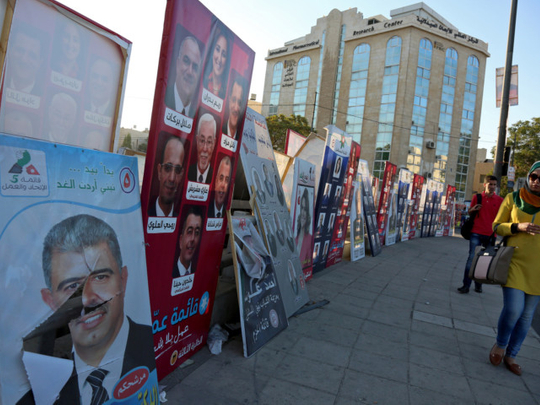
Dubai: In the midst of a region occupied by turmoil, conflicts and massive refuges problems, Jordan is holding parliamentary elections on Tuesday, in what the government says is a sign of its serious commitment to democracy and reforms.
Jordan traditionally votes according to tribal and family allegiances but parliament amended the electoral laws in March in a move government sources and political analysts say will lead to more candidates from political parties vying for votes.
Under the newly adopted election rules the country is divided into 23 districts, and voters choose candidates from competing lists in their district rather than individuals.
There are 1,252 candidates running on 226 district lists. Voters can select one or more candidates on a list.
The Jordanian government has touted the new voting system as a significant step toward political reform.
Government spokesman Mohammad Momani said it was impressive that Jordan was actually holding an election in a region wracked by violence and turmoil.
“It shows the credibility of Jordanian institutions and the reform process,” he said.
Meanwhile, Tareq Momani, Editor-in-Chief of the Jordanian Al Rai newspapers told Gulf News that there were are many political parties participating in Tuesday’s election, including the Islamic Action Front, the political arm of the Muslim Brotherhood, despite the banning of the party in Egypt.
Jordan held its last parliamentary elections in 2013. The country goes to the polls every four years, but King Abdullah dissolved the parliament in May, two months after announcing the new election rules and called for a fresh election, putting caretaker prime minister Hani Al Mulqi in charge.
Jordanians over the age of 17 are eligible to vote and this year that number is 4 million — double the number during the 2013 election.
Mousa Shteiwi, director of the Centre for Strategic Studies at the University of Jordan, told Gulf News he expects voter turnout to be similar to previous years at around 40 per cent.
He said his figure is based on the “very wide base” of eligible voters rather than those registered to cast their ballots.
Commenting on voter enthusiasm, Shteiwi said expected turnout is no lower then previous elections, describing it as a “semi-routine process”.
He said he believes people will base their vote on candidate personality rather than affiliation to specific political parties or ideologies.
A total of 130 parliament seats are up for grabs in Tuesday’s vote, with 15 seats reserved for women, nine for Christians and three for minority Chechens and Circassians.
Bread and butter, unemployment, poverty and daily life issues are at the heart of the candidates’ campaigns and people’s concerns.
The Palestinian issue is also important to voters as the majority of Jordanians are originally Palestinian.












